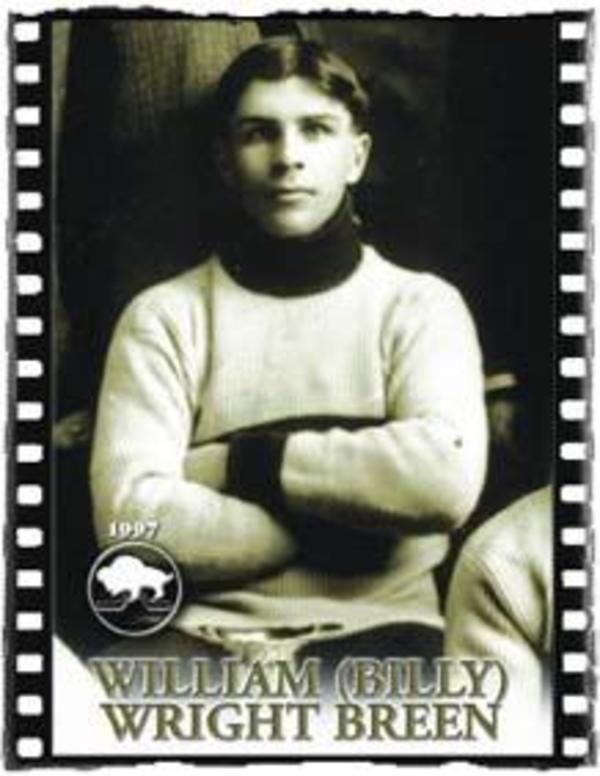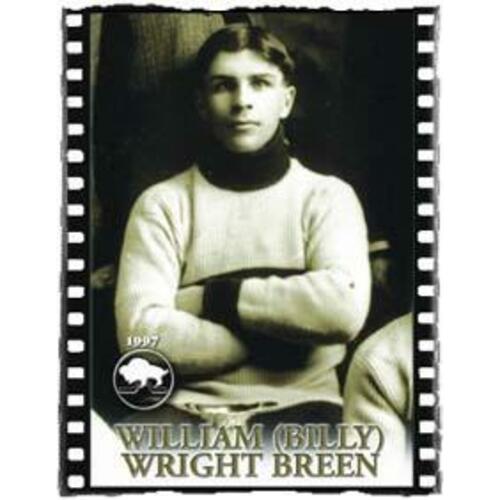
Source: Link
BREEN, WILLIAM WRIGHT, athlete and businessman; b. 6 Dec. 1882 in Winnipeg, son of Richard Breen, caretaker of the Dominion Lands Office, and Sarah Ann Wright; m. 7 Jan. 1911 Mabel Campbell Rankin in Moose Jaw, Sask., and they had one son; d. 3 Sept. 1927 in Rochester, Minn., and was buried three days later in Winnipeg.
William Breen, usually known as Billy, was one of Winnipeg’s best athletes in the early 20th century. He was a skilful bowler and golfer. As a young man he excelled in soccer. The sport in which he achieved a national reputation, however, was hockey and his career illustrates both the problems confronted and the possibilities enjoyed by the foremost hockey players of his era.
Breen was a member of a respected Winnipeg family. His parents had come to the city directly from Ireland early in the 1880s and had helped found Young Methodist Church. His athletic abilities were evident during his years at Mulvey School and Central Collegiate. From 1899 until 1907 he was a member of either the Winnipeg Hockey Club or the Winnipeg Rowing Club’s hockey club. The organizations he belonged to were always part of the best senior amateur league in Manitoba, and in those years the best senior amateur league in Manitoba was always one of the best in Canada. Breen led the league in goals during five of his eight seasons. In 1903–4 he was a star on the Rowing Club team that challenged the Ottawa Silver Seven [see Francis Clarence McGee*] for the Stanley Cup. The Winnipeg team lost two of the three games in the strongly contested series; seven of its nine players were hurt. Included in the Manitoba Free Press’s list of injured players was Breen, “bruised and broken-up.”
During 1907–8 and 1908–9 Breen played in a professional hockey league in Manitoba. The league was not successful, and it ceased to operate early in 1909. It experienced difficulties that were common in early professional leagues in many sports: extremely violent games, “fixed” matches or at least allegations of “fixing,” players and owners who broke contracts or agreements, and teams which folded part way through a season.
After his professional experience, Breen never again played high-quality hockey. He did not join other Manitobans who by this time were accepting offers to play for professional clubs in eastern Canada, in the United States, or, after 1911, on the Pacific Coast. Just why he stayed home is not known. Perhaps he considered himself a bit small (he was approximately five feet six inches tall and weighed 140 pounds) for the professional game; his age may have been a factor; perhaps also he wanted to keep his position as a bookkeeper with Codville Company, wholesale grocers in Winnipeg.
Breen would have played senior amateur hockey in Winnipeg if he had been able to regain his amateur status. In the years from about 1910 to 1914 Winnipeg had the best senior league in Canada and Breen wanted to play in it. The officers of the Manitoba branch of the Amateur Athletic Union of Canada were opposed to professional sport and wanted to punish those who had fostered it. Winnipeg lawyer Robert Allison Coyne Manning argued that Breen and others who had played professional hockey in 1907–9 had done so only because during those specific years the calibre of amateur hockey was so weak. Breen became a referee and a coach and it was for his dedicated work in these roles that he was finally reinstated as an amateur in 1913. By this time, however, he had not played for four seasons and he did not attempt a comeback.
In 1914 Billy Breen joined his two brothers, Nixon John and Thomas George, in forming Breen Motor Company Limited, a successful automobile dealership. He was secretary-treasurer of the company when he died of lymphosarcoma in 1927. He was also a member of several prestigious organizations, including the Carleton Club and the St Charles Country Club.
AM, MG 10, D17; D26. Minn., Dept. of Health, Registry of vital statistics (Minneapolis), Death records, 3 Sept. 1927. Private arch., Morris Mott (Brandon, Man.), Amateur Athletic Union of Canada, Manitoba sect., minutes, 1912-20; Ed Sweeney (Winnipeg), Information on W. W. Breen. St John’s Anglican Cathedral (Winnipeg), Reg. of burials, 6 Sept. 1927. Manitoba Free Press, 1899-1913, 5 Sept. 1927. Winnipeg Telegram, 1907-8. Winnipeg Tribune, 1907–10, 6 Sept. 1927. F. S. Cosentino, “A history of the concept of professionalism in Canadian sport” (ma thesis, Univ. of Alta, Edmonton, 1973). R. S. Gruneau and David Whitson, Hockey night in Canada: sport, identities and cultural politics (Toronto, 1993). Bruce Kidd, The struggle for Canadian sport (Toronto, 1996). K. L. Langsley, “The Amateur Athletic Union of Canada and changing concepts of amateurism” (phd thesis, Univ. of Alta, 1971). Alan Metcalfe, Canada learns to play: the emergence of organized sport, 1807–1914 (Toronto, 1987); “The meaning of amateurism: a case study of Canadian sport, 1884–1970,” Canadian Journal of Hist. of Sport (Windsor, Ont.), 26 (1995), no.2: 33-48. Don Morrow, “A case study in amateur conflict: the athletic war in Canada, 1906–08,” British Journal of Sports Hist. (London), 3 (1986): 173-90. Morris Mott, “The problems of professionalism: the Manitoba Amateur Athletic Association and the fight against pro hockey, 1904–1911,” in Winter sports in the west, ed. E. A. Corbet and A. W. Rasporich (Calgary, 1990), 132-42; “‘Tough to make it’: the history of professional team sports in Manitoba,” in The geography of Manitoba: its land and its people, ed. John Welsted et al. (Winnipeg, 1996), 302-14.
Cite This Article
Morris Mott, “BREEN, WILLIAM WRIGHT,” in Dictionary of Canadian Biography, vol. 15, University of Toronto/Université Laval, 2003–, accessed December 20, 2025, https://www.biographi.ca/en/bio/breen_william_wright_15E.html.
The citation above shows the format for footnotes and endnotes according to the Chicago manual of style (16th edition). Information to be used in other citation formats:
| Permalink: | https://www.biographi.ca/en/bio/breen_william_wright_15E.html |
| Author of Article: | Morris Mott |
| Title of Article: | BREEN, WILLIAM WRIGHT |
| Publication Name: | Dictionary of Canadian Biography, vol. 15 |
| Publisher: | University of Toronto/Université Laval |
| Year of publication: | 2005 |
| Year of revision: | 2005 |
| Access Date: | December 20, 2025 |



